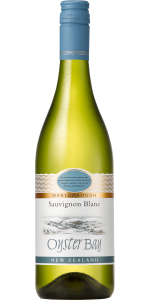
Description
Stunningly aromatic tropical fruits and bright citrus notes, with a refreshingly zesty finish.
Pale straw green in colour with brilliant clarity, Oyster Bay Marlborough Sauvignon Blanc is zesty and aromatic with lots of lively fruit characters. A concentration of assertive passionfruit and tropical fruit flavours with an abundant bouquet, it is a wine that is always crisp, elegant and refreshing.
Awards
4 stars Michael Cooper’s Buyer’s Guide
Alcohol
12.0%
Analytical data
dry
Product Range
The philosophy of Oyster Bay is to produce fine, distinctly regional Super Premium wines that are elegant and assertive, with glorious fruit flavours. Oyster Bay produces wines from the renowned regions of Marlborough and Hawke's Bay.
Vineyard
Prime central Wairau, Renwick, and Brancott soils. Shallow, sandy loams over deep layers of free draining river gravels, providing low to moderate fertility and excellent drainage. The Marlborough region located at the top of New Zealand’s South Island provides a dry, sunny, but temperate climate, which allows the grapes a long, slow period of ripening spanning from January to April. The clear, cold nights keep acid levels high in the grapes, even when their sugars are rising. These day/night temperature variations are a crucial climatic influence that retains the grapes’ crisp, fresh, vibrant fruit characters.
Winemaker
Michael Ivicevich
Viticulture
New Zealand’s position in the Pacific Ocean provides a unique, temperate maritime climate. The benefit of a cool climate with long sunshine hours is an extended growing season with a long, slow period of ripening. This allows the well ripened grapes to develop strong, intense varietal characteristics whilst maintaining a balanced, crisp, natural acidity. Over thousands of years the continual process of mountain building and erosion by glaciers, floods, and wind, has deposited alluvial soils on the riverbeds and terraces throughout much of New Zealand. These are the soils in which the vines of New Zealand’s renowned wine regions grow unique, quality grapes.
Vinification
Throughout harvest, fruit was selected from progressively later ripening vineyard blocks, commencing with the coastal vineyards. Upon receipt to the winery, the grapes were destemmed and transferred to the tank presses where the free-run juice was separated and the remaining fruit lightly pressed. The juice was clarified and then inoculated with a select range of yeasts for added complexity and aromaticity during fermentation in stainless steel tanks. A slow, temperature controlled fermentation at 54–59˚F (12–14˚C) was undertaken. After a short period of yeast lees contact, the wine was racked for final blending and bottled young to ensure that the fresh, crisp, and elegant varietal characters were retained.
